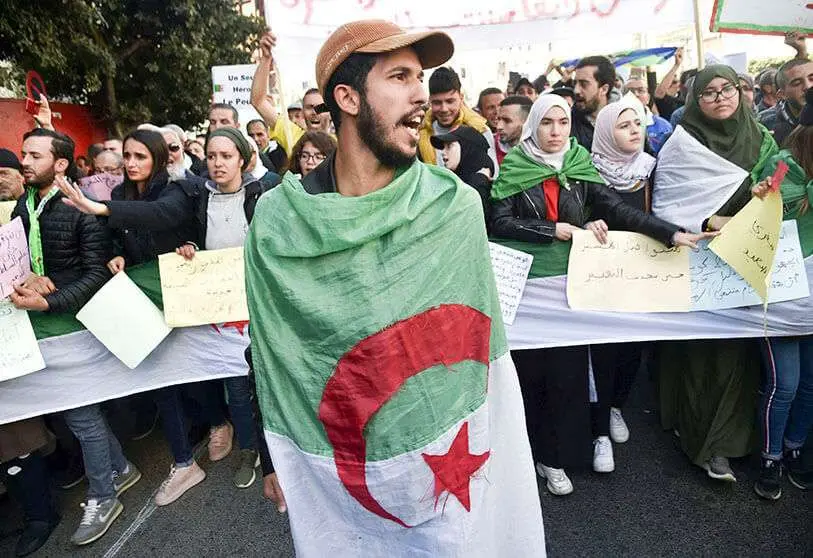Algeria, the Hirak and the Constitution

While Chileans are rejoicing, singing and dancing in the streets to share their joy of writing a new Constitution to replace the one inherited from Pinochet, in Algeria, the new Constitution divides.
On 1 November the Algerians are expected to vote on the bill proposed by the president of the republic. The date was not chosen at random. 1 November corresponds to the outbreak of the Algerian war of liberation against French colonisation, which would lead to independence in 1962. This year, we want to celebrate a new Algeria.
This Algeria of tomorrow, so long awaited by the Hirak (a protest movement born in 2019 and which led to the resignation of President Abdelaziz Bouteflika after 20 years in power and in turn enabled the current president to take office).
Is the new constitution a response to Hirak or a response to the movement's recovery?
At the moment it is polarising the debate in Algeria; editorialists, political parties and citizens are asking the question, creating doubts. Because in Algeria we suffer more than anything from a lack of confidence in the state institutions. On the one hand, there are the people and on the other "the power", which often opposes the former.
Will the Algerian president achieve a federation? This is one of the issues at stake in this vote.
Tebboune said he was proposing "a real separation and better balance of powers by introducing more consistency in the functioning of the executive and by rehabilitating Parliament, especially in its role of monitoring government action".
Reactions to the first draft of this constitution were quick in coming. The famous lawyer and human rights defender, Mr Bouchachi, did not hesitate in an open letter to condemn and punish this constitution which, he said, "establishes a personal power in which the President of the Republic is like an emperor who interferes in the prerogatives of the legislative and judicial powers, in addition to the levers of control he exercises through appointments". The lawyer warns against the grey areas because, according to him, this constitution opts for a regime that "is neither parliamentary nor presidential nor semi-presidential (...) is at odds with all democratic constitutions", he warns.
It is true that the stakes are high for individual freedoms, freedom of religion and freedom of expression. The trials of journalists that have shaken the country for several months, particularly that of Khaled Derarni, are strong indicators of the scale of the tragedy.
The famous writer and journalist Kamal Daouad, in an open letter, asked the Algerian president to free Algeria, which is still in the clutches: "Mr President, free them, free us, free yourself (...) First of all I must tell you that I did not vote on 12 December 2019. However, my mother did. She absolutely wanted to. The act and the right to vote have a history and a cost in her eyes. It is the story of a lifetime.
For me, and for many of my generation, it is free, acquired, neglected. Like so many beautiful things in this country. Mr. President, our country is vast, bigger than our vanities. It cannot be reduced to two boulevards, or a capital city, or a palace. Its history is painful. Its present is sometimes illegible to us, its future worries and compromises us. However, it is up to each one of us to assume our weight and to know our true self: a son of Algeria, not its owner.
Will the president respond to this appeal and to that of millions of Algerians who are mobilising for the release of journalists and political prisoners, he who wanted to reassure himself by declaring that it was "impossible for one person to take power and act at will and according to his state of mind", thus referring to the former president of the Republic?
After being approved by Parliament and in the absence of the opposition, which did not attend the session on 10 September, the draft Constitution will undoubtedly become a reality in the coming days. At a time when calls for boycott continue, the Minister of Youth and Sport, Sid Ali Khaldi, said, referring to the new Constitution at a meeting organised by a sports association, that "for the first time since independence, we have constitutionalised the 1 November declaration, and anyone who is not convinced can simply move to another country". A speech that was widely criticised and condemned by the majority to the extent that the minister had to apologise. But this statement reveals a deep division between the ruling class and the citizens.
In Algeria it is difficult to shake off the good habits of power that can be summed up in two attitudes: the first is contempt for the people and the second is ownership of the country by the ruling class. The former head of government Mouloud Hamrouche came out of his silence and, in an open forum, also called for prudence and change: "To continue to want to act outside the Algerian national consciousness, without political commitment, outside any process and control, outside any participation and structuring of public opinion is to feed the status quo and its disastrous results, to maintain fragilities, to aggravate fractures and to delay reflection on the major national problems, their solutions and resolutions," he summed up.
The abstention rate on this vote is likely to be high and the insufficient clarity of the new amendments and provisions seems to sow doubts in the absence of a dispassionate and inclusive national debate.

